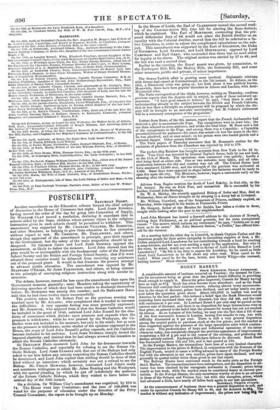POSTSCRIPT.
SATURDAY NIGHT.
Another amendment on the Education scheme formed the chief subject of discussion in the House of Commons last night. Lord Joust RUSSELL having moved the order of the day for going into Committee of Supply, Sir WILLust ClAr moved a resolution, declaring it expedient that in schools aided by the State, children whose parents object to the religious instruction given in such schools should bo permitted to withdraw. This amendment was supported by Mr. CHARLES VILLIERS, Mr. ROEBUCK, and other Members, as helping to give State education its due extension without regard to sect. Mr. CHRISTIE, Mr. TRELAWNEY, and others, though they approved of the amendment in principle, gave their support to the Government, lest the safety of the main proposition should be en- dangered. Sir GEORGE GREY and Lord Joint RUSSELL opposed the amendment, as likely to defeat the measure. Lord John showed that the plan would be so incompatible with the fundamental rules of the National School Society and the British and Foreign School Society, that if it were adopted those societies would be debarred from receiving any assistance out of the proposed grant. It would in fact frustrate the present attempt to advance public education. The amendment was opposed by Mr. STAFFORD O'BRIEN, Sir JOHN Paitutarozr, and others, as being counter to the principle of conveying religious instruction along with secular in- struction.
The debate, however, turned far less upon the amendment than upon the Government measure generally; some Members taking the opportunity of delivering speeches of which they had been unable to discharge themselves .before: Dr. Bowittivo was among this number; and Sir BENJAMIN HALL said that he had risen twelve times unsuccessfully.
The position taken by Sir Robert Peel on the previous evening was touched upon by Mr. AcLAND; who complained that it tended to increase the difficulties. A very opposite feeling was more generally expressed; and Mr. ROEBUCK, who augured from it that the Roman Catholics would be included in the grant of 1848, satirized Lord John Russell for the elas- ticity of conscience which shrinks upon pressure and expands when the pressure is withdrawn: while he was pressed by the Wesleyans, the Ca- tholics were not included iu his measure, but only in his mind; but as soon as the pressure is withdrawn, under shelter of the opinions expressed in the House, the scope of Lord John Russell's policy expands, and the Catholics become included in his embrace. Lord Join{ RUSSELL sharply denied the imputed elasticity, and insisted that he had always avowed his intention to admit the Roman Catholics ultimately.
Sir BENJAMIN Ham. censured Lord John for his demeanour towards the Roman Catholics, and especially for refusing to see the Roman Ca- tholic Bishops. Lord JOHN Russitu. said, that one of the Bishops had only asked to see him before any minute respecting the Roman Catholics should be determined, and Lord John replied that nothing should be done of that kind without an interview; which certainly was not a refusal to see the Bishop. Mr. PHILIP HOWARD, however, contrasted Lord John's ready and courteous willingness to admit Mr. Jabez Bunting and the Wesleyans, with the special pleading by which he put off indefinitely the audience of the Roman Catholic Bishops, which they wished to have before the critical day of the 19th instant.
On a division, Sir William Clay's amendment was negatived, by 210 to 74. The House went into Committee; and the sum of 100,0001. was voted for the purposes of education under the direction of the Privy Council Committee; the report to be brought up on Monday.
In the House of Lords, the Earl of CLARENDON moved the second read- ing of the Customs-duties Bill, (the bill for altering the Rum-duties); which he explained. The Earl of MONTROSE, contending that the pro- posed differential duty of 9d would not place the British distiller on an equality with the Colonial distiller, moved that the bill be referred to a Se- lect Committee, in order to adjust the complicated calculations on the sub- ject. This amendment was supported by the Earl of EGLINTON, the Duke of RICHMOND, Lord STANLEY, and Lord MONTEAGLE ; opposed by Lord CAMPBELL and Earl GREY, who contended that there was no need either for inquiry or for alarm. The original motion was carried by 57 to 48; and the bill was read a second time.
Earlier in the evening, the Royal assent was given, by commission, to the Exchequer Bills Bill, the Mutiny Bills, the Indemnity Bill, and some other measures, public and private, of minor importance.


























 Previous page
Previous page